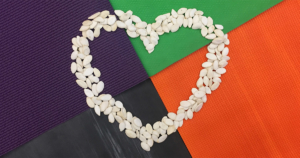 Which came first: the pumpkin or the pumpkin seed?
Which came first: the pumpkin or the pumpkin seed?
It’s one of those great mysteries we may never be able to answer. What we do know is that in terms of receiving national honors, National Pumpkin Seed Day (today) precedes National Pumpkin Day, which we’ll celebrate every year on October 26th.
We also know that pumpkins and their seeds have been around a long time. Native to the Americas, the oldest evidence of pumpkin-related seeds were found in Mexico, and date back to somewhere between 7000 and 5500 BCE.
Eat Your Pumpkin Seeds!
In addition, we know that pumpkin seeds—aka pepitas—are packed with vital nutrients. They are especially rich in minerals—manganese, phosphorous, magnesium, copper and zinc. In addition they are packed with protein and antioxidants, in particular, Vitamin E and lignans.
Animal studies have shown pumpkin seeds, extract and oil to help balance insulin in diabetic animals. They have long been valued for their antimicrobial and anti-viral properties. Pumpkin seeds’ high antioxidant content also may be helpful in prevention and treatment of prostate and breast cancers.
Here’s the best way to light-roast pumpkin seeds to preserve their vital nutrients, according to World’s Healthiest Foods:
“Place the seeds (whether those you retrieved from the pumpkin or those you bought at the store) in a single layer on a cookie sheet and light roast them in a 160-170°F (about 75°C) oven for 15-20 minutes. This 20-minute roasting limit is important. In a recent study, 20 minutes emerged as a threshold hold time for changes in pumpkin seed fats. When roasted for longer than 20 minutes, a number of unwanted changes in fat structure of pumpkin seeds have been observed by food researchers. Roasting for no longer than 20 minutes will help you avoid these unwanted changes.”
Finally, here are some suggestions for enjoying pumpkin seeds:
- Sprinkle them on salads
- Top your morning cereal—hot or cold—with pumpkin seeds
- Sprinkle them into soups
- Pack them with you for a midday snack
- Add them to muffins or cookies
